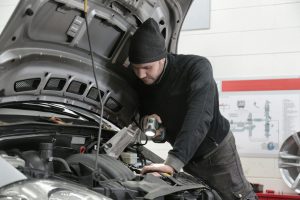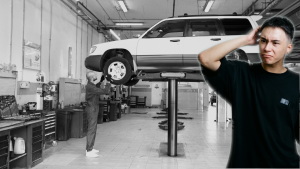In the second of this two-part series, we suggest six things you can do for your vehicle to stretch out the interval between fill-ups.
1. Check tire pressure
One of the most important things to do to promote fuel efficiency is to ensure that your tires are properly inflated. Under-inflated tires can lead to increased friction, which in turn can lead to decreased fuel economy. Check your tire pressure on a regular basis and keep them at the recommended pressure levels. (Tip: If you are using the MyRide901 app, you can store the recommended tire pressure in the About My Ride panel for future reference.)

2. Change the oil and air filter regularly

Another important aspect of vehicle maintenance that can promote fuel efficiency is to regularly change the oil and air filter. Dirty oil and air filters can impede the flow of air and oil to the engine, which can lead to decreased fuel economy. It’s recommended to change the oil and air filter every 5,000 to 8,000 kilometers, or as recommended by the vehicle’s manufacturer.
3. Regular engine tune-ups
A well-maintained engine can also promote fuel efficiency. A regular tune-up can help to ensure that the engine is running at its optimal level. This can include replacing spark plugs, checking the ignition system, and adjusting the carburetor if your vehicle has one. Not only will a well-tuned engine lead to better fuel economy; it will improve overall engine performance.

4. Wash it!

Believe it or not, keeping your vehicle clean can also help improve fuel efficiency. A dirty vehicle can have an increased drag, which can lead to decreased fuel economy. Wash your vehicle regularly to remove dirt, grime, and other debris that can accumulate on the vehicle’s exterior.
5. Check wheel alignment
Correct wheel alignment is another fuel saver. Regularly checking your vehicle’s alignment, brakes, and suspension can help to promote fuel efficiency. Misaligned wheels can cause increased friction, which can lead to decreased fuel economy. Worn brakes and suspension components can lead to increased resistance and decreased fuel economy.
6. Fuel system maintenance
Lastly, it’s important to keep an eye on the vehicle’s fuel system. A clogged fuel filter or a malfunctioning fuel injector can lead to decreased fuel efficiency. It’s recommended to have the fuel system checked on a regular basis to ensure that it is functioning properly.
Keeping your vehicle well-maintained is essential for promoting fuel efficiency. Regular maintenance, including checking and maintaining tire pressure, changing oil and air filters, regularly tuning up the engine, keeping the vehicle clean, regular check of alignment, brakes, suspension, and fuel system can help to ensure that the vehicle is running at its optimal level and can lead to better fuel economy and fewer costly repairs.
Bonus Tip: Use MyRide901 to track maintenance
Not sure when your vehicle’s oil was last changed? Or when the fuel system was checked last? MyRide901 can help—it’s a vehicle maintenance log that captures and manages oil changes, tune ups and other maintenance, such as fuel system checks, as Service Events on a timeline. MyRide901 also helps you find out when the next service should be performed on your vehicle, and what specific items need to be checked or replaced—simply tap the NEXT SERVICE button and enter your VIN.






